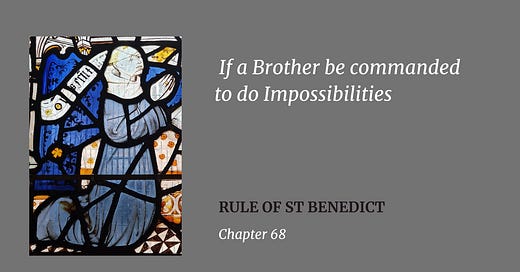The Rule of St Benedict Chapter 68
If a Brother be commanded to do Impossibilities
Text
If it happens that something burdensome or impossible is imposed on a Brother, let him receive this command of his superior with all humility and obedience.
Si cui fratri aliqua forte gravia aut impossibilia injunguntur, suscipiat quidem jubentis imperium cum omni mansuetudine et obedientia.
But if he believes the burden entirely exceeds his strength, let him suggest his inability to his superior patiently and at an appropriate time, not with pride, or resistance or opposition.
Quod si omnino virium suarum viderit pondus excedere, impossibilitatis suae causas ei qui sibi praeest patienter et opportune suggerat, non superbiendo, aut resistendo, vel contradicendo.
But if after his suggestion, the superior, in his opinion, persists with his command, let the junior Brother know that it is right for him, and let him obey out of love, trusting in the help of God.
Quod si post suggestionem suam in sua sententia prioris imperium perduraverit, sciat junior ita sibi expedire, et ex caritate confidens de adjutorio Dei, obediat.
In these posts I take a chapter of St Benedict’s Rule for monks, translate it and add some comments from monastic writers or from my own experience.
Comment
This is a short chapter but of great importance. We have already covered the principle of obedience, but here it comes to the fore. What if a monk is asked to do something he thinks are impossible for him to do? He may think he does not have the physical or mental strength, the knowledge, skills or experience for the job he has been given.
St Benedict doesn’t immediately jump to “trust in God”; first he says that the monk can explain to his superior why he thinks the task is not possible for him to accomplish. The superior may have made a mistake or misjudgment. But if the superior persists and insists the monk do the task as commanded, he must obey, trusting in God. This is the true core of obedience and, for me, a very hard saying.
I have a type of work which I hate doing; I don’t think I am particularly good at it, though the only time my work in this was tested in court I did pass the test, so I’m not hopeless, obviously. But it is something which disrupts my life and sleep, I worry about it and things pop into my head at all sorts of odd times. I asked God not to give me any more of this kind of thing. His response? More of it.
So I had to accept it. I adjusted my approach a bit, used other tools to help me practically and for the rest, just prayed and trusted in God. I have just finished another of these projects and have another one lined up for next month, so clearly this is a lesson I need to learn. It’s slowly getting easier – prayer is the absolute requirement in this case, and then just relying on God to get me through it.
Dom Delatte, in his commentary, mentions the women going to the tomb on Easter Sunday, saying to each other “Who will roll the stone away for us?” That didn’t stop them going to do what they knew they had to.
I may not be a monk, and neither are you, but obedience to God’s will is certainly something we should all practice.
If you don’t want to take out a paid subscription, but wish to support my writing please consider leaving a tip! Thanks for your support.
Have you seen my new publication - Shepherd’s Prayer? Available now via Amazon around the world, the isbn is: 979-8344184814.






I love the balance of Saint Benedict of Nursia in his rule. He acknowledges here human frailty of both strength and perception. He makes great allowance for the Divine Grace of God to manifest itself in the obedient life of a humble believer. I believe this is a reason that the RSB has stood for fifteen centuries 📗 as a template for, "How can Christians live out our faith, together?" ⏳🏔️😌♥️
Q: I use the Abbott Justin McCann parallel Latin / English for years. Do you have any critique or experience with that translation?
Grace and peace to you Amigo, Christ is RISEN!
Pray for Translators! 🔔📚✍🏼🌐🕊️☦️⛪⚖️🔥⛲
Fair enough Amigo.